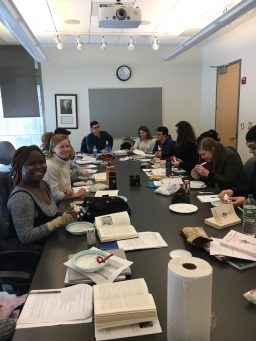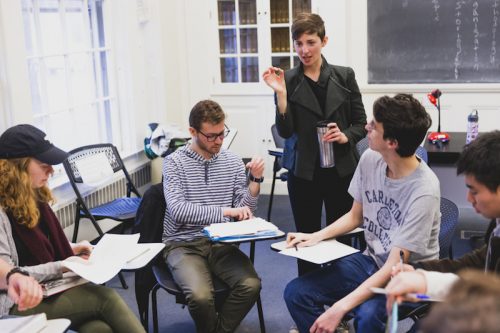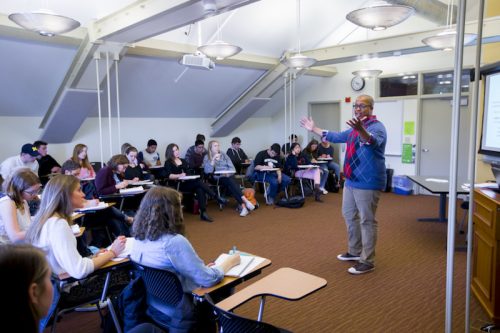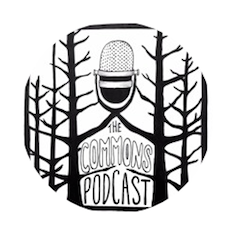Why Scholarly Research Should be Podcast At Least Some of the Time
By Rebecca Goldfine
When Bowdoin historian Meghan Roberts clicked open a student-made podcast on prison reform, she did not anticipate laughing out loud. But the podcast includes an interview with the 18th-century philosopher Voltaire, who though long dead still animatedly conveys his pique at past injustices. The recording also has ads for durable torture instruments, and a rap song that Voltaire and fellow Enlightenment thinker Beccaria “wrote” to rouse the public to oppose torture.
“It was amazing to see how far above they went with the class assignment,” Roberts said, speaking about the podcast creators, Sarah Kinney ’20 and Michael Donnelly ’20. (Listen to “Punishment N’ You,” in which Kinney and Donnelly explore the evolution of early-modern to modern punishment. The song begins at 21:09.)
Last spring, Roberts, an associate professor of history who specializes in 18th-century France, tried something new in her Crime and Punishment seminar. She asked small teams of students to make podcasts assessing the history behind a contemporary issue related to the class themes. She proposed some possible subjects: incarceration rates, the development of humane prisons, or the evolution of execution methods. Like her other assignments, she asked students to come up with an argument and present evidence in support of it.

The results impressed her. “They brought a lot of creativity and enthusiasm, and it was reflected in their final products,” she said.
Donnelly said he loved making the “Punishment N’ You” podcast. “The whole time we looked at sources, we also got to think about fun and novel ways to present the information,” he said. “Sarah and I had so much fun working on this because we focused just as much on making it entertaining as making it educational.”
Roberts is one of several Bowdoin professors who, in addition to asking students to write more traditional papers, also assigned podcasts this past year. In the current semester, at least three professors are asking students to make podcasts. All the courses receive support from Bowdoin technology consultant Paul Benham, who teaches students how to use the college’s recording and editing equipment.
Theo Greene, an assistant professor of sociology, asked students in his Deconstructing Masculinities class last fall to produce podcasts, and he made podcasting an option for seniors capstone projects about the sociology of millennials. He said he wanted his students to do research grounded in sociological literature and theory, but to deliver it in an accessible way.
Students in Greene’s Masculinities class covered a variety of subjects in their podcasts, from how rural, suburban, and urban men portray themselves on the Tinder dating app, to the role of alcohol in men’s lives.

Greene’s classroom experiment to merge scholarship with popular media, he said, was a reaction in part to what he sees as growing attacks on academia for being elitist. He added that his students, too, often ask him how they can use what they learn at college in their lives. “Students are hungry for knowledge, and they also want to learn how to use that knowledge,” he said.
Emma Moesswilde ’18 worked with Caroline Dranow ’20 on a podcast for Roberts’ class called “Misogyny, Magic and #MeToo: Witchcraft and the Control of Women’s Bodies,” She said she and her co-creator tried to make the subject of witchcraft appealing to a general audience, but that this is not a goal she typically thinks about when writing academic papers. “But it’s a skill that I think is not only essential to the study of history but is also very useful for me personally as I look to career opportunities beyond Bowdoin,” she added.
The trend of communicating academic research with podcasts is not limited to college classrooms. Roberts said historians are increasingly treating podcasts as a form of public engagement. A couple of her favorite ones are “Ben Franklin’s World,” a podcast about early American history, and “Past/Present,” which analyzes today’s news through a historical lens.
Behind the podcasts is a push by scholars to speak more directly to the public about contemporary issues and the historical roots underlying them. “A lot of historians feel really distressed by the way history is represented in popular culture and also in the news,” Roberts said. “And they feel very strongly that historians have a lot to contribute to our public and political discourse.”
And to engage in the public discourse these days often requires deft use of social media. In all of Greene’s classes, he asks his students to practice different forms of writing, from 25-page research papers to blogs and tweets. “It forces them to be creative and makes them distill ideas in a clear and focused way,” he said about the latter forms.
Ida Cortez ’20, who made a podcast for Roberts’ class exploring the attempted assassinations of President Ronald Reagan and King George III, and the ensuing trials of the assassins, said she thought the audio project actually improved her writing. “It pushed me to tell a story in addition to analyzing sources,” she said. “I think that made me a better writer in many ways because I had to take the listener along with me and try to engross them in a world that I had been studying.”

Bowdoin students have created many audio stories about “the Bowdoin experience,” both outside of class and for class assignments, which they share on Soundcloud in a series called The Bowdoin Commons. The topics vary widely: among the offerings, there’s a two-part sociological podcast examining the after-effects of racial conflicts on campus; a piece about a student who tracks wolves; and one on the history of fraternities at Bowdoin.